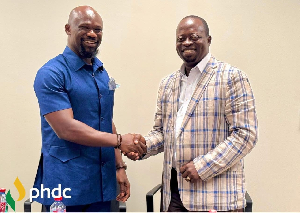Boost for alternative energy …As Ghana begins production of solar systems
Atlas Business and Energy Systems (ABES), a renewable energy solutions provider, has established a production facility in Ghana that will design, produce and install solar and other renewable energy solutions locally.
The company has through a Finland collaboration began assembling solar panels, building charge controllers and other solar components at its Sowutuom plant. Whilst aiming at helping the country to meet its increasing energy demands, ABES also seeks to make the best of technology transfer, by constantly upgrading the competence of its Ghanaian engineers to enable them produce several other renewable energy facilities locally.
The company is also working out the introduction of Green Loans by some Financial Institutions in the country to make it possible for low income earners to afford renewable energy solutions. Speaking at the launch of the production facility and the first solar packages in Accra last week, Dr Adebayo Agbejule, Project Manager for Export and Import Innovations (EXIMIN), Finland, observed that Ghana stands to benefit if its entrepreneurs took up the challenge to be innovative and work out technological solutions that suit their own environment.
He mentioned that scientific and technological innovation has been the underpinnings of all advanced economies, and called on the country to go the same way.
Dr Agbejule who is also a Principal Lecturer in Production Management at the Vaasa University of Applied Sciences, Finland, observed that it was time Ghanaians began thinking of how ``we could address our problems ourselves,” adding that ABES had decided to take up the challenge of helping to improve Ghana´s energy situation the sustainable way``.
Giving the genesis of ABES, Dr Agbejule explained that his outfit, EXIMIN is an EU related project consisting of four universities of applied sciences in Finland with the goal of promoting business opportunities and growth for Finnish SMEs in the African Market starting with Ghana. The EXIMIN project also helps in the search for business partners and cooperation, introduction of new products to new and/ or existing markets, introduction of new types of innovation to improve the business, exploration of the commercial feasibility of your idea in both the Finnish and Africa Markets
Mr. Charles Martinson, General Manager in charge of operations at HFC Bank, observed that heavy dependence on fossil fuels as a source of energy has resulted in the present climatic challenges with its accompanying devastating effects on the global environment.
This according to him has necessitated the development of innovative and affordable energy sources to contain the effects of green house gases on the global economy. He mentioned the high initial cost of renewable energy as an impediment to the adoption of renewable technologies.
Mr. Martinson called for Public-Private Partnerships as the best approach to addressing the country’s energy challenges, adding that banks and other financial institutions have a role to play by bringing on board financing options that will make it easy for individuals to afford renewable energy technologies.
On his part, Mr. Robert Yakohene, Research and Development Manager, UT Bank stressed that it is time financial institutions make available resources devoted to renewable energy financing in view of the critical role energy play in the development of a nation.
He pointed out that UT Bank already has a portfolio for social investments, adding that the bank was ready to assist clients in purchasing their own power source. This, he said, also served as a means for financial institutions to show that they are socially responsible.
In an interview with the Financial Intelligence Newspaper, Nathaniel Gyibah, Managing Director of Atlas Business and Energy Systems (ABES) observed that with the demand for energy in Ghana increasing by about 5% per year in the past 10 years, there is need for capacity addition requirements of about 50MW to 100MW per annum.
According to him, the demand-supply imbalance could worsen if policy makers did not promote the use of alternative energy as the country gears up for a middle income status by 2015.
By making it possible for low income earners to afford solar systems at costs below GH¢ 2,000, the managing director was optimistic that his company will change the energy landscape in the country and avert possible over-reliance on Ghana´s new-found crude for power generation.
“Ghana is blessed with 10 hours of free sunlight every day, and it is only prudent that we make good use of this resource,” he said.
Ghana’s major energy sources since the founding of the nation has been hydro and thermal power plants, the related problems of which have been frequent power outages and fluctuations leading to low?level of reliability. The un?reliable nature of the main sources of energy in the country has left many searching for secondary options.
There are also large areas that have no access to the national electricity grid, making government’s objective of reaching 85% of the population with electricity a difficult challenge.
General News of Tuesday, 16 March 2010
Source: Financial Intelligence(By Kevin Gyahene)












